
The Cars were an American rock band formed in Boston in 1976. Emerging from the new wave scene in the late 1970s, they consisted of Ric Ocasek, Benjamin Orr, Elliot Easton, Greg Hawkes (keyboards), and David Robinson (drums). Ocasek and Orr shared lead vocals, and Ocasek was the band's principal songwriter and leader.
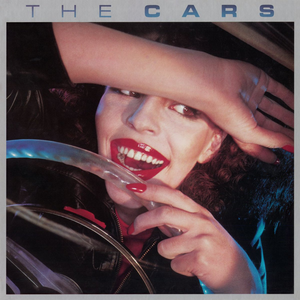
The Cars is the debut studio album by American rock band the Cars, released June 6, 1978 by Elektra Records. The album was produced by longtime collaborator Roy Thomas Baker, and spawned several hit singles, including "Just What I Needed", "My Best Friend's Girl", and "Good Times Roll", as well as other radio and film hits such as "Bye Bye Love" and "Moving in Stereo". The Cars peaked at number 18 on the US Billboard 200 album chart, and has been certified 6x platinum by the Recording Industry Association of America (RIAA).
Song structure is the arrangement of a song, and is a part of the songwriting process. It is typically sectional, which uses repeating forms in songs. Common piece-level musical forms for vocal music include bar form, 32-bar form, verse–chorus form, ternary form, strophic form, and the 12-bar blues. Popular music songs traditionally use the same music for each verse or stanza of lyrics. Pop and traditional forms can be used even with songs that have structural differences in melodies. The most common format in modern popular music is introduction (intro), verse, pre-chorus, chorus, verse, pre-chorus, chorus, bridge, and chorus, with an optional outro. In rock music styles, notably heavy metal music, there is usually one or more guitar solos in the song, often found after the middle chorus part. In pop music, there may be a guitar solo, or a solo performed with another instrument such as a synthesizer or a saxophone.
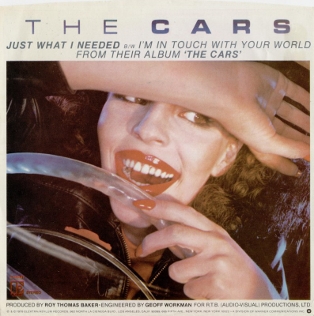
"Just What I Needed" is a song by American rock band the Cars from their self-titled debut album (1978). The song, which first achieved radio success as a demo, took inspiration from the Ohio Express and the Velvet Underground. The song is sung by bass player Benjamin Orr and was written by Ric Ocasek.
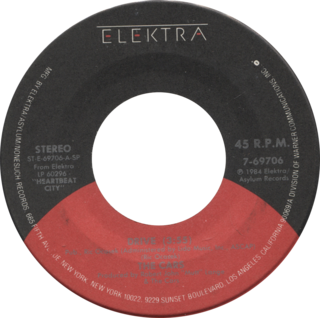
"Drive" is a song by American rock band the Cars from their fifth studio album, Heartbeat City (1984). It was released on July 23, 1984, as the album's third single. Written by Ric Ocasek, the track was sung by bassist Benjamin Orr and produced by Robert John "Mutt" Lange with the band. Upon its release, "Drive" became the Cars' highest-charting single in most territories. In the United States, it peaked at number three on the Billboard Hot 100 and topped the Adult Contemporary chart. It reached number five in the United Kingdom, number four in West Germany, number six in Canada and number three in Ireland.
"Moving in Stereo" is a song by the American rock band The Cars. It appeared on their first album, The Cars, released in 1978. It was co-written by Ric Ocasek and the band's keyboard player Greg Hawkes, and sung by bassist Benjamin Orr.

The New Cars were a band formed in 2005 by two of the original members of the 1970s/1980s new wave band the Cars. The band was composed of original Cars members Elliot Easton and Greg Hawkes, along with vocalist/guitarist Todd Rundgren, bassist/vocalist Kasim Sulton, and drummer Prairie Prince. The band performed the Cars' songs, some new material, and selections from Rundgren's career.

This Side of Paradise is the second solo studio album released by Ric Ocasek, lead singer and songwriter of the Cars. It was released in 1986 by Geffen Records. Though it was a solo album, other members of the Cars played significant roles. Greg Hawkes plays keyboards and bass throughout the album, and also co-wrote "Hello Darkness". Benjamin Orr is on backing vocals for three songs. Along with Hawkes and Orr, the track "True to You" also features Elliot Easton on guitar. Both production and drumming were by Chris Hughes. Hughes had been the recent producer of Tears for Fears most popular two albums. Steve Stevens from Billy Idol's band plays guitar on over half of the album.

"Good Times Roll" is a song by American rock band the Cars released as the first track from their 1978 debut album The Cars. Written by Ric Ocasek as a sarcastic comment on rock's idea of good times, the song features layered harmonies courtesy of producer Roy Thomas Baker.

"All Mixed Up" is a song by the Cars and the final track on their 1978 self-titled debut album. It was written by bandleader Ric Ocasek.
"Dangerous Type" is a 1979 song by the Cars from their second studio album, Candy-O. It was written by Ric Ocasek.

"My Best Friend's Girl" is a song by American rock band the Cars from their 1978 self-titled debut album on Elektra Records, released on June 6 of that year. Written by Ocasek as a song about something that "probably ... happened to a lot of people," the track found radio success as a demo in 1977.

"It's All I Can Do" is a song by the American rock band the Cars. It is the third track from their 1979 album Candy-O. It was written by the band's leader and songwriter Ric Ocasek, and features bassist Benjamin Orr on vocals.

"Tonight She Comes" is a 1985 song by American rock band the Cars from their Greatest Hits album. It was released as a single in October 1985, reaching number seven on the Billboard Hot 100 in January 1986. The song reached number one on the Top Rock Tracks chart, where it stayed for three weeks.
"Candy-O" is a song by the American rock band the Cars, the title track of their 1979 album Candy-O. Written by Ric Ocasek, the song was not based on a real person. The song features a prominent guitar solo by Elliot Easton and lead vocals by bassist Benjamin Orr.
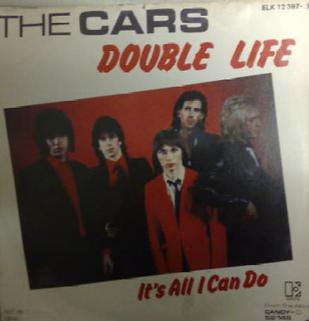
"Double Life" is a single by the American rock band the Cars from their second album Candy-O. Written by Ric Ocasek, the song was almost left off the album. The song was released as the third single from the album in 1979, but did not chart.

"I'm Not the One" is a song by the American rock band the Cars, from their fourth album, Shake It Up. It features Ric Ocasek on lead vocals, Benjamin Orr singing the 'you know why' phrase, and the whole group repeating "going round and round" as backing vocals throughout the song.

"Since You're Gone" is a song by the American rock band the Cars. It was released as the second single from their fourth album, Shake It Up.
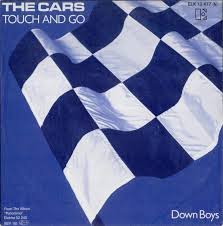
"Touch and Go" is a song by American rock band the Cars from their 1980 album Panorama. The song was written and sung by bandleader Ric Ocasek.
"Panorama" is a 1980 song by the Cars from their third studio album, Panorama. It was written by Ric Ocasek. Despite not being released as a single, the song has since become "a cult favorite".















